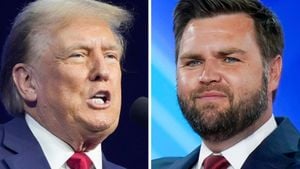Donald Trump is making waves with his latest cabinet nominations for his anticipated second term. Following the announcement of his choices, it’s become evident there's been a marked shift from his previous administration. His recent picks are raising eyebrows and igniting discussions all around Washington.
The latest confirmation is the nomination of Susie Wiles, who played key roles during Ronald Reagan’s campaign, as Trump’s chief of staff. Wiles has long been entrenched in far-right politics, not shying away from voicing her disdain for insufficiently loyal party members. “The clown car can’t come to the White House at will,” she previously remarked, insinuation aimed at management practices within government.
The Trump team appears heavily determined to staff his new administration with loyalists who align closely with his rightist ideologies. This time around, he's clearly leaning on figures who not only support his agenda but also embody the extreme, hard-right principles he cherishes.
Recent announcements reveal more about his direction. Marco Rubio, known for his pro-Israel stance and support for Ukraine, is slated to lead the State Department. Critics of Trump's choices signal this might perpetuate existing imperialistic policies, especially concerning Middle Eastern geopolitics. Meanwhile, Rep. Elise Stefanik is poised to become the U.S. ambassador to the United Nations, with Rep. Mike Waltz stepping up as national security advisor, raising alarms about their past actions linked to America’s involvement overseas.
Trump’s cabinet is reportedly packed with names like former Arkansas Governor Mike Huckabee for U.S. ambassador to Israel, who has stirred controversies with his apocalyptic worldview and dismissive views on Palestinian lives. Huckabee once stated, “There’s really no such thing as a Palestinian.” Such sentiments echo questions about the administration’s humanitarian future and stance on foreign relations.
Adding to the alarm, Trump's pick for Secretary of Defense, Pete Hegseth, seems to be among the most controversial. Hegseth, known largely for his television career and his military background, has previously made headlines for his views on torture and Islam. He subscribes to Christian nationalist ideologies and forwards extreme rhetoric, claiming, “America will decline and die. A national divorce will ensue.” This sort of language raises flags about how the military might respond to domestic dissent under his leadership.
The current climate allows for the assumption this might not be just about policy, but also about solidifying Trump’s narrative: pulling together individuals who share his opinions and outrage at perceived threats—internal and external. For example, Hegseth argues the necessity of defending against “internal enemies,” blending seamlessly with Trump’s rhetoric on combating socialism and “secularism.”
Interestingly, two names frequently floated around were prominent GOP figures Nikki Haley and Mike Pompeo; both mysteriously did not make the cut for consideration. According to Trump himself, “I will not be inviting former Ambassador Nikki Haley or former Secretary of State Mike Pompeo to join the Trump administration.” This statement has been interpreted as Trump's desire to forge a cabinet more reflective of his hardline followers.
Aggravation continues to build as Trump’s cabinet evolves. Recently, controversy erupted surrounding Matt Gaetz’s nomination as Attorney General. A figure known for his bombanding style and fierce loyalty to Trump, Gaetz withdrew from consideration amid serious allegations of sexual misconduct. Critics describe his departure as not just embarrassing for the Trump camp but also indicative of how delicate his administration might be should it continue to rely on deeply flawed individuals.
Despite Gaetz stepping down, Trump quickly pivoted, nominating Pam Bondi, the former Attorney General of Florida, instead. She is recognized for her allegiance to Trump during his impeachment hearings, setting the tone for loyalty over experience as the driving force behind Trump’s picks.
Illustratively, the backdrop of Trump's cabinet is intertwined with Project 2025—a plan initially downplayed by Trump but now seemingly taking center stage as his transition team pulls names directly from its archives. This initiative aims to construct major changes within government operations and fill key positions with staunchly conservative figures.
The inclusion of figures like Stephen Miller, noted for drafting some of Trump’s hardest anti-immigration policies, casts shadows on Trump’s claims of steering clear of the extremist right. Miller’s impending return to the administration as both deputy chief of staff and homeland security advisor speaks volumes about the future direction of Trump's policies.
On top of it all, the advent of the “Department of Government Efficiency” proves controversial. With tech moguls Elon Musk and Vivek Ramaswamy at the helm, critics worry about potential conflicts of interest. Their aim to downsize the federal workforce is echoed within agendas found in Project 2025, signaling danger for thousands of jobs and public services.
This newly formed department will reportedly focus on cutting government budget costs, possibly at the expense of effective governance. Their approach hints at replacing government agencies with privatized services, leaving many wondering about the future of public works under this administration.
Adding yet another layer to the mix, Robert F. Kennedy Jr. has recently tossed his name as potential head of the Department of Health and Human Services. Although previously leaning liberal, his recent pivot to conservative support for Trump raises eyebrows about ideological consistency and the potential motives lurking behind such appointments.
Overall, as Trump constructs his new administration, it appears clear he is not just seeking to occupy positions with traditional Republican candidates, but instead, assembling people who align closely with hard-right ideologies. The balance of governance and public welfare is at risk and only time will assess whether this selection of cabinet members leads to more incendiary national policies or will be tempered by moderate elements. The future of America under Trump’s second term is bound to be tumultuous and unprecedented.



